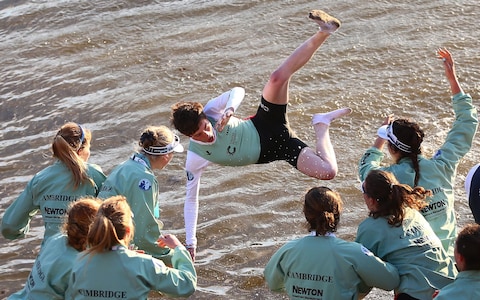Whatever Happened to the Boat Race?
Traditions are an important part of any culture and one tiny part of our national identity is the throwing in of the victorious coxes at the end of the Oxford and Cambridge Boat Races. They were particularly dramatic races this year, but neither the cox of the Women’s Race nor the Men’s was thrown in. Why? Because levels of E.Coli were far too dangerous and several crew members had suffered from sickness before the race. In 16 tests around Hammersmith Bridge there were an average of almost 3,000 E.coli units in each 100ml of water. Ten times higher than the level graded as ‘poor’!
This is symbolic. Symbolic of a deeply damaged relationship between Man and Nature; Man and our only Planet.

Religions around the world attach profound importance to water. It lies at the heart of rituals of cleansing, purification, spiritual healing, life and rebirth. When we send rockets to the moon or distant planets of Jupiter, the search for water is often at the heart of the mission. It is fundamental to our existence.
So what has happened to make our rivers and beaches so dangerous? I remember when the water boards were privatised in 1989, I decided not to buy any shares. Apart from my ethical scruples I thought, ‘Our water and sewage infrastructure is largely Victorian. It has done brilliantly but is now a liability. It will cost a fortune to replace. How will shareholders ever make a profit?’ How incredibly naïve of me!
Margaret Thatcher’s government generously used taxpayers’ money to wipe out all existing debts so the new companies could start with clean sheets. Since then, shareholders have taken £57 billion in dividends while at the same time running up debts of £60 billion. Last year, when the Environment Agency reported half a million discharges of raw sewage into our rivers, averaging 3 billion litres a day, the companies blamed the rain rather than their own failure to invest in new infrastructure. We have all witnessed increased rainfall and flooding as a consequence of climate change, but this has been widely known for 25 years and predicted by scientists for far longer. There has been ample time to prepare.
It was a political decision in 1989, but the issue also runs far deeper than politics. It is about the mismatch between the care we should show for nature and the ecosystems we depend on, and the fundamental trajectory of capitalism. The prime objective of capital is to make profit. Massive profits have indeed been made, whether out of water or oil – but at great expense! Timothy was profoundly accurate when he wrote: ‘The love of money is the root of all evil.’ Somehow, if we want to live in harmony with Nature and build a future for Humanity, we will need to take the greed out of Capitalism. That is going to require deep reconstruction of our economic model.
